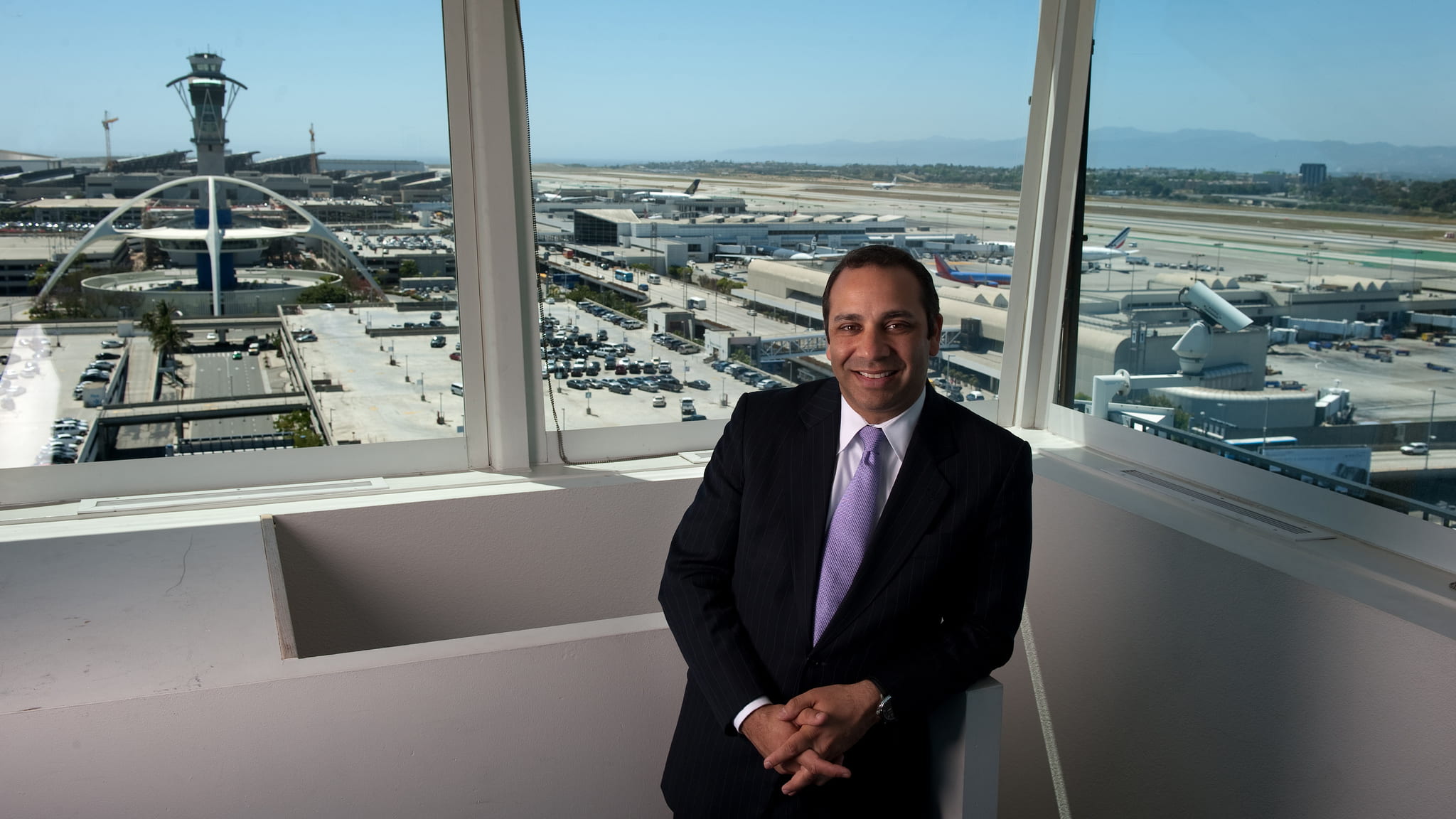Out of harm's way

After climbing a narrow stairwell and boarding a small elevator, Arif Alikhan reaches his destination: the top of the old air traffic control tower at Los Angeles International Airport. From the empty perch, he can watch the steady stream of jets, cars and other vehicles pulsing through the airport’s complex maze of roads and runways.
“LAX has a very high tempo. We have nine terminals; it’s almost like nine airports. We transport 61 million passengers a year and 1.8 million tons of cargo,” Alikhan says. “How do you secure an airport with so many people coming and going?”
It’s a question the UC Irvine alumnus deals with every day as deputy executive director of law enforcement and homeland security at Los Angeles World Airports, which owns and operates LAX and the Ontario and Van Nuys airports. Major earthquakes and other natural disasters, terrorist attacks, security breaches, criminal activity — anything that could disrupt the flow of humanity 12 stories below falls under his purview. “My purpose is to protect people from harm,” Alikhan says.
Since assuming this role last November, he’s dealt with all kinds of issues — none of them, fortunately, catastrophic.
“Something always comes up, whether it’s a power outage, someone with a weapon at a screening checkpoint, or someone passing away during a long flight,” he says. “There’s no daily routine to this job.
“We recently stopped a theft ring. People were going around the parking lots stealing the third-row bench from Cadillac Escalades, which are very valuable. We set up a sting operation and made arrests. We also had a demonstration by pro-labor groups and a flood in the Sepulveda tunnel that caused major delays.”
Alikhan’s wide-ranging duties include overseeing the three airports’ policing, emergency response and counter-terrorism efforts.
Securing LAX poses special challenges, he says. Not only is it the world’s sixth busiest airport, it’s the busiest origin-and-destination facility (measured by the number of passengers visiting the area, not just those making a connecting flight at the airport). That means more people to screen, and more potential for something to go wrong. (But don’t blame him for the long lines at LAX’s 77 security check-in lanes. Those are managed by the U.S. Transportation Security Administration.)
“Aviation is still a target for terrorism. It has been for decades, even before 9/11,” Alikhan says. “People forget about the hijacking and bombing incidents in the 1970s.”
He stresses the importance of good intelligence and public vigilance — the reporting of unattended baggage, for example — in combatting such acts.
“You’ll never be able to do everything to prevent terrorism, so you try to do the right things with what you have,” he says. “LAX is fortunate to have significant counter-terrorism resources. Our goal is to stop an attack before it happens.”
Alikhan has been interested in protecting and serving the public since he was a UCI undergraduate, when he was appointed commissioner of campus safety by the Associated Students and worked as a technical reserve officer for the Newport Beach Police Department. He earned a bachelor’s in social ecology in 1990.
“The program at UCI gave me hands-on experience,” Alikhan says. “To fulfill the field study requirement, I interviewed police officers about their coping mechanisms for stress. I talked to an officer who had survived a helicopter crash and another who was involved in a shootout with a robbery suspect. I was able to take what I learned at UCI and translate it into real life.”
After graduating from Loyola Law School in Los Angeles and working as a career prosecutor for 10 years with the U.S. Department of Justice, he served as Los Angeles’ deputy mayor for homeland security and public safety from 2006 to 2009.
“Arif Alikhan has been instrumental in advancing my administration’s central priorities of preparing Los Angeles to respond to natural disasters and against the threat of terrorism, increasing public safety and putting 1,000 new LAPD officers on our streets,” remarked Los Angeles Mayor Antonio Villaraigosa, when Alikhan left for Washington, D.C., to become assistant secretary for policy development at the U.S. Department of Homeland Security, a post he held from 2009 to 2011. Before joining Los Angeles World Airports, he was a distinguished professor of homeland security and counterterrorism at the National Defense University, the U.S. military’s graduate school in Washington, D.C.
The son of immigrant parents (his mother is from Pakistan and his father is from India), Alikhan is big believer in the importance of diversity and different perspectives to address emerging issues. He believes that the diversity of America is one its strength in tackling complex social problems.
“Policy is about solving problems, and one of the best ways to do that is to look at things in different ways. Diversity factors into that,” he says. “That’s especially true in countering terrorism. We need to understand different perspectives and try to address threats in innovative ways.”
That worldly viewpoint helps him at LAX — which has been dubbed “the gateway to the Pacific Rim” because it’s a prime port of entry for China, Japan, Taiwan, South Korea and other nations.
“We get a lot of dignitaries and diplomats coming through the airport,” Alikhan says. Government officials — but not celebrities — receive extra security.
“President Obama was here last week,” he notes. In fact, the president’s departure caused quite a stir. Two F-16 military fighter jets had to be dispatched after a small private plane violated Air Force One’s restricted air space.
“This is L.A.,” Alikhan says with a shrug. “There’s always something interesting going on.”
Originally published in ZotZine Vol. 4, Iss. 9